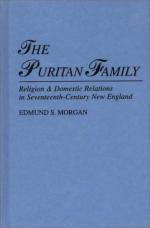|
This section contains 2,048 words (approx. 7 pages at 300 words per page) |

|
By the final years of the seventeenth century, the influence of Puritanism in New England was fading. The region would never completely lose its distinctively Puritan character, but by 1700, Puritanism's hold over the social, religious, and political life of New England was increasingly challenged by other ideas and values.
An "Inordinate Affection to the World"
As the 1600s drew to a close, the communal ideal stressed by John Winthrop had lost much of its appeal for the people of New England. The compact, close-knit towns favored by the Puritan founding fathers were unraveling as more and more New Englanders chose to settle on isolated farms. Many factors contributed to the decline of the closely settled town in New England. The most important of these was probably the region's growing population. By the late 1600s, there was very little unclaimed farmland close to most towns...
|
This section contains 2,048 words (approx. 7 pages at 300 words per page) |

|



